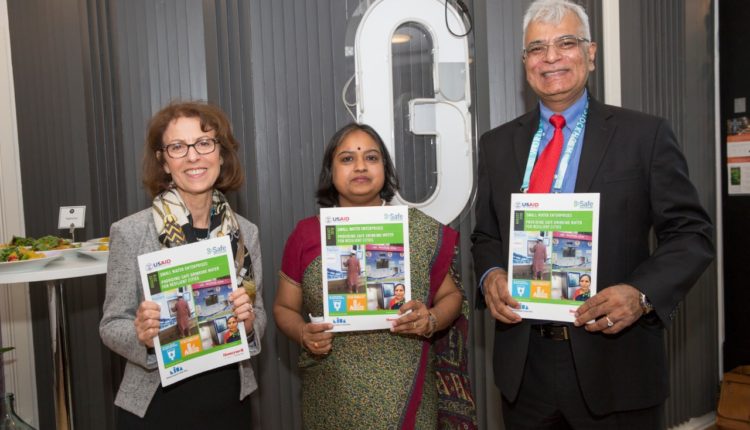
New Delhi: The report on Small Water Enterprises: Providing Safe Drinking Water for Resilient Cities, a collaboration between Safe Water Network India and the National Institute of Urban Affairs (NIUA), USAID Urban WASH Alliance Partners, puts forward recommendations to support the transformation of India’s cities from water stressed to resilient with respect to safe drinking water.
Small Water Enterprises can benefit not only growing cities of India but other cities in the world struggling to mitigate climate change and keep pace with rapid urbanization. Cities and their residents who are seeking a better future need 24×7 access to safe, affordable water in easy reach of their living and working spaces. The report recommends including Small Water Enterprises (SWEs) as decentralized safe drinking water solution in city planning for the creation of resilient cities and thereby achieving the twin benefits of safe water for citizens and livelihood generation. It highlights the benefits and potential of expanding the SWE category in the urban environment, and recommends enhanced collaboration and partnerships between the Government and the private sector to achieve this objective.
At the launch of the report, Ravindra Sewak, India Country Director, Safe Water Network said
“Nearly 820 million people in India live beyond treated piped water. Niti Aayog’s Composite Water Management Index (CWMI) Report highlights that India is facing the worst water crisis in its history, with millions of lives and livelihoods under threat today. The crisis is only going to get worse. By 2030, the country’s water demand is projected to be twice the available supply, implying severe water scarcity for hundreds of millions of people and an eventual ~6% loss in the country’s GDP.
Small Water Enterprises provide a safe, reliable, affordable and sustainable alternative to address the need gap in many towns and cities. SWEs can fill the gap and compliment Urban Local Bodies’ (ULBs) effort towards providing piped water supply. Including SWEs in urban planning for the creation of resilient cities expand the options for the Government to develop public private partnerships, facilitate direct investments and development in ways that will support, and contribute to urban growth and renewal.”
Prof Jagan Shah, Director, National Institute of Urban Affairs said, “Cities face a growing range of adversities and challenges. Resilience is what enables them to adapt and transform in the face of these challenges, helping them to prepare for both the expected and the unexpected. In April 2018, 100 Resilient Cities (100RC) pioneered by the Rockefeller Foundation and the National Institute of Urban Affairs (NIUA) announced a formal partnership to expand collaborative resilience-building efforts in India. Safe drinking water supply is prominent among the adversities and challenges facing India especially as migration and the pace of growth of urban cities and slums accelerates.”
He further added, “The current infrastructure broadly, and the provision of safe water supply specifically, are insufficient to meet the demands of the increasing population. The Government needs to create the most conducive enabling environment to facilitate opportunities for business to contribute to innovation, and for local community initiatives to thrive. Small water enterprises are one such initiative that can meaningfully contribute to safe water supply and resilient cities.”
Sri Bonthu Rammohan, Mayor of Hyderabad city, said, “The city of Hyderabad alone, needs 800 such 24×7 SWE solutions so that citizens do not need to buy expensive plastic bottled water. It also prevents the environmental pollution due to plastic bottles.” Under his leadership, the city has set up hundreds of small water enterprises already.
In India, nearly 17 percent of the urban population (65 million people) live in slums and more than 50 percent of the 14 million urban poor families lack access to safe piped water supply. This gap in supply is often met by Urban Local Bodies (ULBs) through provision of community-level standpipes or tankers. However, the quality of water from these sources is usually unsafe, and water supply is often available for only a few hours a day, thus leading to water conflicts at the collection point, water borne disease and also the loss of economic opportunity.
SWEs address this unmet need to provide high-quality treated water, complementary to the Government’s piped water efforts. To achieve this objective, SWEs are included in the SMART cities and AMRUT city program by the Ministry of Housing and Urban Affairs. However, there is need of increased funding and conducive policy and enabling environment and regulatory framework is needed for the advancement of SWEs and building safe drinking water security.

